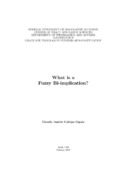Use este identificador para citar ou linkar para este item:
https://repositorio.ufrn.br/handle/123456789/18683| Título: | What is a Fuzzy Bi-implication? |
| Autor(es): | Olguín, Claudio Andrés Callejas |
| Orientador: | Bedregal, Benjamin René Callejas |
| Palavras-chave: | Bi-implicacão difusa;Equivalência difusa;Di-residuation difusa;Lógica difusa;Fuzzy bi-implication;Fuzzy equivalence;Fuzzy bi-residuation;Fuzzy logic |
| Data do documento: | 13-Fev-2012 |
| Editor: | Universidade Federal do Rio Grande do Norte |
| Referência: | OLGUÍN, Claudio Andrés Callejas. What is a Fuzzy Bi-implication?. 2012. 54 f. Dissertação (Mestrado em Ciência da Computação) - Universidade Federal do Rio Grande do Norte, Natal, 2012. |
| Resumo: | A fim de tornar este documento auto-suficiente, nós apresentamos toda a teoria necessária como arcabouço teórico. Em seguida, estudamos várias definições que estenderam a bi-implicação clássica para o domínio da bem estabelecida lógica difusa, ou seja, no intervalo [0; 1]. Essas abordagens da bi-implicação difusa podem ser resumidas da seguinte forma: duas definições axiomatizadas, que demonstramos que representam a mesma classe de funções, quatro padrões definitórios (dois deles proposto por nós), que variam com o número de diferentes operadores que as compõem e quais restrições que tinham para satisfazer. Nós demonstramos que esses padrões definitórios representam apenas duas classes de funções, tendo uma como uma subclasse própria da outra, mas sendo ambas subclasses da classe representada pelas definições axiomatizadas. Uma vez que esses três clases satisfazer algumas restrições que julgamos desnecessárias, propusemos um novo padrão definitório sem essas restrições e que representa uma classe de funções que se interseta com a classe representada pelas definições axiomatizadas. Nesta dissertação estamos pretendendo estabelecer as bases para futuras pesquisas sobre este operador |
| Abstract: | In order to make this document self-contained, we first present all the necessary theory as a background. Then we study several definitions that extended the classic bi-implication in to the domain of well stablished fuzzy logics, namely, into the [0; 1] interval. Those approaches of the fuzzy bi-implication can be summarized as follows: two axiomatized definitions, which we proved that represent the same class of functions, four defining standard (two of them proposed by us), which varied by the number of different compound operators and what restrictions they had to satisfy. We proved that those defining standard represent only two classes of functions, having one as a proper subclass of the other, yet being both a subclass of the class represented by the axiomatized definitions. Since those three clases satisfy some contraints that we judge unnecessary, we proposed a new defining standard free of those restrictions and that represents a class of functions that intersects with the class represented by the axiomatized definitions. By this dissertation we are aiming to settle the groundwork for future research on this operator. |
| URI: | https://repositorio.ufrn.br/jspui/handle/123456789/18683 |
| Aparece nas coleções: | PPGSC - Mestrado em Sistemas e Computação |
Arquivos associados a este item:
| Arquivo | Descrição | Tamanho | Formato | |
|---|---|---|---|---|
| ClaudioACO_DISSERT.pdf | 445,4 kB | Adobe PDF |  Visualizar/Abrir |
Os itens no repositório estão protegidos por copyright, com todos os direitos reservados, salvo quando é indicado o contrário.

